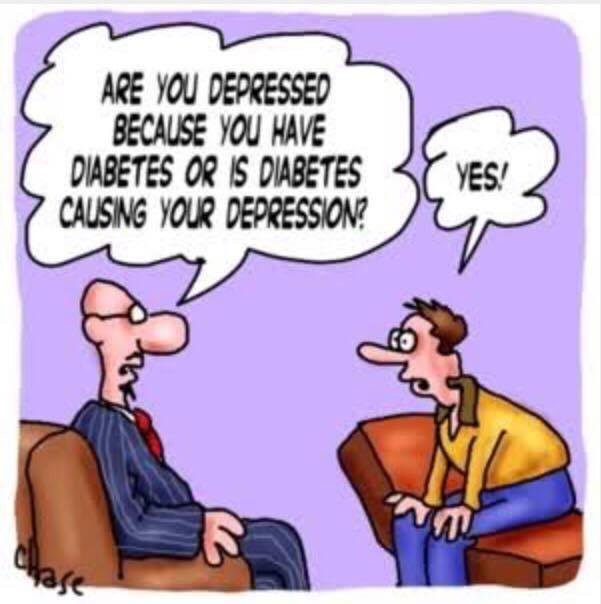
As more studies have been conducted, medical professionals now understand that diabetes brings with it the hidden risk of depression. In fact, diabetes can increase the chances of a person developing depression by 50%. With depression comes inactivity, fatigue, susceptibility to illness, cravings for easy burning calories like carbohydrates and sugars, a distancing of relationships, difficulty in the workplace or in school, and an overall sense of doom and defeat. Considering that 35% of all diabetics have significant depression and 11% have major depression, it is easy to understand why this topic deserves a closer look.
One of the first treatment options for depression recommended by most doctors is prescribed drugs. There are certainly cases when medications are necessary, but they come with their own side effects and drawbacks. Some of the most common side effects of antidepressant medications are nausea, increased appetite and weight gain, loss of sexual desire and other sexual problems, fatigue and drowsiness, insomnia, dry mouth, blurred vision, and constipation. Each of these things can impact one’s ability to manage their blood sugar consistently.
So, it begins to make sense to start exploring other ways of treating depression. I am not opposed to medications, and I have seen many people benefit from using them, including myself. But it is important to weigh the benefits and cost of treatments. There is no “magic bullet” when it comes to treating depression. Antidepressant medications mask and cover up symptoms, they do not cure the underlying cause of the depression. This means that the depression continues, and that users will likely need to increase their dosage in order to feel less as their depression continues. When you are able to treat the cause of the depression, there are fewer symptoms to manage and less need for medication.
You might be wondering why we are talking about hypnosis as a treatment of depression with diabetes. The bottom line is that one of the contributing factors of depression is the person's physical state. Studies show that high blood sugar levels cause biochemical changes within the brain that can lead to depression. Unfortunately, several doctors are still missing the connection between depression and diabetes and focus treatment on the obvious physical aspects of the disease.
The good news is that today, some medical doctors are beginning to recognize the benefits of hypnosis as a treatment option so that you can have the best of both worlds, being treated with hypnosis for the depression as well as being treated with prescription drugs, if necessary.
If you live with depression resulting from diabetes, remember that ignoring the problem only puts you at greater risk for additional problems. Even children can experience bouts of depression brought on by diabetes, and they can benefit from hypnosis as well. Depression can be devastating not just to the one suffering, but to your family and friends, as well as the people who care about you. They are wanting to support you as they watch you struggle.
The main problem with traditional treatment for diabetes is that it does not address the underlying causes. Much of diabetic treatment focus solely on preventing and managing complications rather than resolving the contributing factors. Yes, patients are instructed to lose weight and eat better, but often they are not receiving enough support and guidance in these efforts, especially since much of that behavior is subconscious.
The Role of Hypnosis
For some, the word “hypnosis” conjures up images of mind control and manipulation, or of people acting very willy on a stage. I understand how these images can make a person uncomfortable. The truth is, that couldn’t be farther from the truth. Hypnosis is a natural state that allows you to remain in complete control while creating some pretty significant changes.
Hypnosis has been a medically recognized phenomenon for well over four decades. In 1958, the American Medical Association and the American Dental Association made resolutions recognizing hypnosis as an accepted form of treatment in medicine and dentistry. This was three years after the British Medical Association passed a formal resolution approving hypnosis as a valid therapeutic technique for treating neuroses and for relieving pain in surgery and childbirth.
Many fear hypnosis because they fear a loss of control, yet a person is actually more in control of their body when he or she is in a state of trance. This fact should interest people with diabetes, because control is exactly the issue that concerns them: controlling blood sugar levels. As most people with diabetes already know, blood sugar is impacted by almost everything, including emotions, sleep patterns, stress, illness, physical activity, and what we eat.
Hypnosis is not meant to replace standard medical treatment. In fact, hypnosis is most effective when used in conjunction with traditional health care. Your mind and body are complicated and have many different moving parts with many different needs. The best and most beneficial treatment involves combining methods. Just like combining diet and exercise is more effective when losing weight, hypnosis and other treatments can be more effective together.
In addition to depression, diabetes can also bring about other problems such as fatigue, mood swings, ulcers, and more. Again, hypnosis performed by a reputable hypnotist or hypnotherapist can bring those things under control. With the power of suggestion to the subconscious mind, the behaviors and consequences of those behaviors can be changed. Instead of just dealing with change of cognitive function when living with diabetes to include severe depression, you might consider hypnosis because it works.
Now is the time to take charge of your life. If you are already overweight, have diabetes, and suffer from depression, or if you are concerned of developing diabetes, hypnosis can make a significant difference in your life.∎
Karen Gray is a Certified Hypnotist, a Registered Nurse, and the Director of Green Mountain Hypnosis. For more information on how you can use hypnosis to change your life, you can visit www.greenmountainhypnosis.com, contact Karen at karengray@greenmountainhypnosis.com, or call (802) 566-0464.